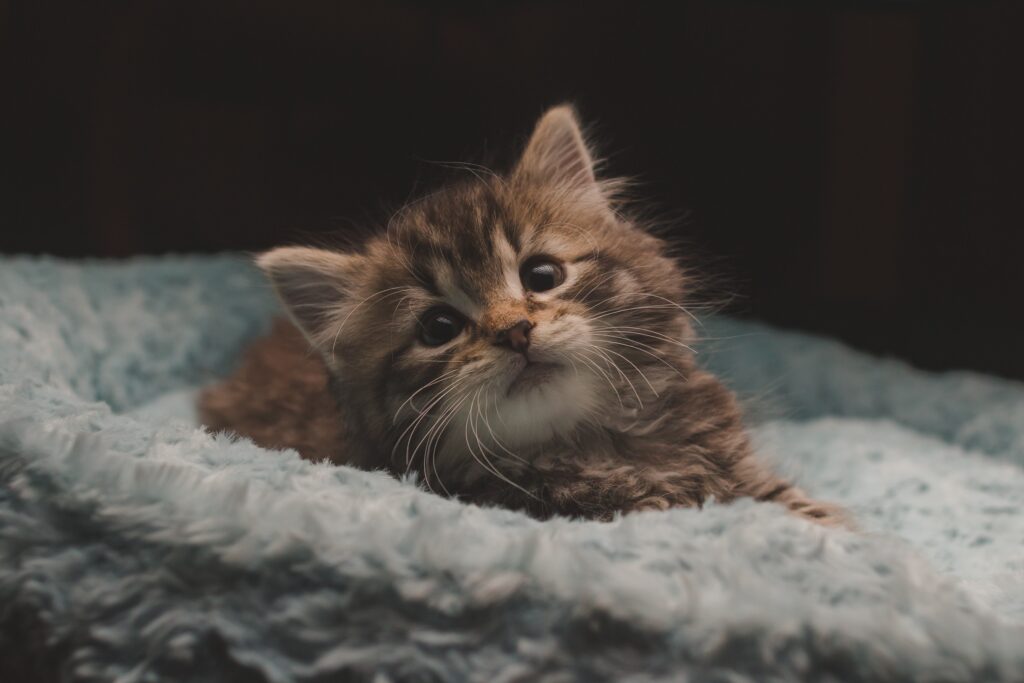How Do I Care For A Newborn Kitten Expert Guide

How Do I Care For A Newborn Kitten? So you’ve just found a tiny, helpless kitten abandoned by its mother, and now you’re wondering how to care for this fragile creature. Well, caring for a newborn kitten is no small feat, but with the right knowledge and dedication, you can provide the love and attention needed for their survival. From creating a safe and warm environment to understanding their feeding schedule and nutrition, there’s a lot to learn. But fear not, because, in this discussion, we’ll guide you through the essentials of caring for a newborn kitten, ensuring their health and happiness every step of the way.
The Importance of Newborn Kitten Care
Proper care for a newborn kitten is of utmost importance to ensure their health and well-being. As a caregiver, it is crucial to understand the significance of shelter medicine and the various aspects of caring for a newborn kitten. In this section, we will discuss the importance of maintaining proper warmth for newborn kittens, feeding techniques, and a proper diet, as well as post-feeding care.
Maintaining proper warmth is crucial to prevent chilling and ensure the well-being of newborn kittens. Newborn kittens are unable to regulate their body temperature, so providing a warm and cozy environment is essential. Use a heating pad or a heat lamp set to a safe and comfortable temperature. Make sure to provide a space where the kittens can move away from the heat source if they become too warm.
Feeding techniques and a proper diet play a significant role in the healthy development of newborn kittens. It is essential to feed them a specially formulated kitten formula rather than cow or goat’s milk. These formulas provide the necessary nutrients for their growth. Consult with a veterinarian to determine the appropriate feeding schedule and quantities for your kittens.
Post-feeding care is equally important. After each feeding, gently burp the kittens to prevent any discomfort caused by air intake during nursing. Use a warm, damp cloth to clean their faces and bottoms, simulating the actions of their mother’s tongue. Stimulation for elimination is crucial for their hygiene. Gently rub their genital area with a warm, damp cotton ball to encourage urination and bowel movements.
Creating a Safe and Warm Environment
To ensure the health and well-being of a newborn kitten, it is essential to create a safe and warm environment. Keeping the kitten warm is crucial, as their body temperature can drop quickly if they get too cold. One way to provide warmth is by using a heating pad or heating disk. Set it on low heat and place it under a blanket or towel in the kitten’s area. This will create a cozy and warm spot for the kitten to rest.
Maintaining the right temperature is vital. The ideal temperature for a newborn kitten is around 85°F or 29°C. You can use a thermometer to monitor the temperature and make adjustments as needed. It is crucial to ensure that the area is not too hot or too cold, as extreme temperatures can be harmful to the kitten’s health.
In addition to providing warmth, it is also important to create a safe environment for the newborn kitten. Make sure the area is free from any hazards that could harm the kitten. Keep electrical cords, toxic plants, and small objects out of reach.
Creating a comfortable nest for the kitten to rest in is also essential. Use soft blankets or towels to create a cozy spot for the kitten to sleep. Make sure the bedding is clean and changed regularly to maintain hygiene.
Remember to monitor the kitten’s comfort regularly. If they seem too cold, adjust the heating pad or provide additional blankets. If they appear too warm, remove some of the bedding or adjust the temperature in the room accordingly. By providing a safe and warm environment, you are ensuring the well-being of the newborn kitten.
Feeding Schedule and Techniques
When it comes to feeding a newborn kitten, establishing a proper feeding schedule is crucial. To ensure their growth and development, it is recommended to feed them every 2-3 hours, including during the night. When bottle-feeding, remember to hold the kitten on their stomach and tilt the bottle to mimic their natural nursing position.
Feeding Frequency Recommendations
How often should you feed a newborn kitten? Feeding frequency recommendations are crucial when it comes to caring for a newborn kitten. During the first week of their life, these tiny creatures should be fed every 2-3 hours. As they grow older and reach 2 weeks, you can adjust the feeding schedule to every 3-4 hours. By the time they are 3 weeks old, you can stretch the time between feedings to every 4-6 hours.
It’s important to monitor their weight and growth to ensure they are getting enough nourishment. At around 6 weeks old, you can start transitioning them to three or more feedings of canned food throughout the day. Remember, consistency and regular monitoring are key when it comes to bottle-feeding newborn kittens.
Bottle-Feeding Techniques
Now that you understand the recommended feeding frequency for a newborn kitten, let’s explore the essential bottle-feeding techniques that will ensure their proper nourishment and growth. When it comes to bottle-feeding a newborn kitten, it is important to use the right equipment. Opt for kitten bottles with elongated nipples and adjust the nipple hole size for milk flow.
Before feeding, sterilize the bottles and wash your hands thoroughly. Hold the kittens on their stomachs and tilt the bottle to feed them. To ensure the milk is at the right temperature, warm it up and test it on your wrist. Stick to kitten formula like KMR for their nutritional needs. Follow the feeding frequency guidelines based on the kitten’s age and remember to burp them after each feeding. After feeding, clean the kittens with a warm, damp washcloth. For kittens under 4 weeks, remember to stimulate elimination. Lastly, if you have any concerns about the health of the newborn kitten, seek veterinary care promptly.
Proper Nutrition for Newborn Kittens
To ensure proper nutrition for newborn kittens, it is crucial to stick to kitten formula like KMR and avoid feeding them cows or goat milk, as it can be harmful to their health. Newborn kittens, who are typically less than two weeks old, are not able to digest regular cow’s or goat’s milk properly. Their digestive system is not fully developed, and they require specific nutrients found in kitten milk replacer (KMR) to support their growth and development.
At this stage, when their eyes are still closed, kittens rely solely on their mother’s milk or a suitable milk replacement formula for nourishment. Kitten milk replacer is specially formulated to provide the necessary nutrients, vitamins, and minerals that kittens need to thrive. It is easily digestible and designed to mimic the composition of their mother’s milk, ensuring they receive the proper nutrition.
If you find yourself in a situation where you don’t have access to a kitten milk replacer, you can make an emergency formula at home. However, it is crucial to follow proper guidelines to ensure the formula is safe and provides adequate nutrition for the kittens. Consult with a veterinarian or a professional before attempting to make homemade formula.
Feeding frequency is another important aspect of providing proper nutrition for newborn kittens. During their first week of life, kittens should be fed every two to three hours. As they grow, the frequency can gradually decrease to every four to six hours. It is essential to monitor their weight gain and consult with a veterinarian to ensure they are receiving enough nutrition to support their growth.
As the kittens reach around four weeks old, their eyes begin to open, and they start showing interest in solid food. This is the perfect time to introduce wet food mixed with kitten formula. Slowly transition them to a combination of wet and dry food, and by the time they are fully weaned, they should be eating a balanced diet appropriate for their age.
Ensuring Hygiene and Cleanliness
Keep the nesting area clean and change the bedding as needed to maintain a hygienic environment for the newborn kittens. Newborn kittens are very delicate and susceptible to infections, so it’s crucial to ensure their surroundings are clean and free from any potential sources of contamination. Regularly clean the nesting area by removing any soiled bedding and replacing it with fresh, clean bedding. This will help prevent the spread of bacteria and keep the kittens comfortable.
After feeding the kittens, it’s important to clean them to maintain their hygiene. Use a warm, damp washcloth to gently rub their bodies, paying special attention to their genital area. This will stimulate urination and bowel movements, as newborn kittens are unable to eliminate waste on their own. By gently rubbing their bodies, you are mimicking their mother’s tongue and encouraging them to relieve themselves.
To keep the newborn kittens warm and cozy, cover them with a blanket or a soft, warm towel. This will help regulate their body temperature and make them feel safe and secure. It’s essential to monitor their body temperature regularly to ensure they are neither too hot nor too cold.
Maintaining cleanliness also extends to the kittens’ feeding equipment. Clean bottles and nipples thoroughly with hot, soapy water after each use. To ensure proper hygiene, sterilize the equipment by boiling it for a few minutes or using a sterilizing solution. This will help prevent the growth of harmful bacteria and keep the kittens healthy.
If you notice any signs of illness or discomfort in the newborn kittens, address them promptly and seek veterinary care. Early intervention is crucial in maintaining their hygiene and overall well-being. Remember to wash your hands before and after handling the kittens to prevent the transmission of any potential germs. By following these hygiene and cleanliness practices, you can provide a safe and healthy environment for newborn kittens.
Monitoring the Kitten’s Health
Make it a priority to closely monitor the health of your newborn kitten. Monitoring your kitten’s health is crucial in ensuring their well-being and detecting any potential issues early on. One important aspect to monitor is your kitten’s weight and growth. Weigh your kitten daily and make sure they are gaining at least 10 grams per day. A healthy weight gain is a good indicator of their overall health and development.
In addition to monitoring weight, be vigilant for any signs of illness or distress. Look out for symptoms such as refusal of food, lethargy, diarrhea, vomiting, and delayed motor skills. These can be indicators of underlying health issues that require immediate attention. Observing your kitten’s behavior is also crucial. Pay attention to their litter box usage and overall activity levels. Any sudden changes or abnormalities in these areas should be noted and addressed promptly.
Nursing behavior is another important aspect of monitoring your newborn kitten’s health. Ensure that your kitten is nursing regularly and getting enough milk. If you notice any issues with nursing or feeding, such as difficulty latching or a lack of appetite, it is important to seek guidance from a veterinarian.
Socializing and Bonding With the Kitten
Spend quality time with your newborn kitten, gently handling and petting them to build trust and familiarity. This is an essential step in bonding with your kitten and helping them feel secure in their new environment. As the mother cat would typically groom and snuggle with her kittens to keep them warm, your touch and affection can provide a similar sense of comfort.
To further strengthen your bond, use positive reinforcement techniques like treats and praise. This will encourage your kitten to associate you with pleasant experiences and build a positive relationship. Engaging in playtime with interactive toys and gentle games is also crucial for social development and mental stimulation. Through play, your kitten will learn valuable skills, such as hunting and problem-solving, while also enjoying quality time with you.
Allow your kitten to explore new environments and experiences under supervision. This will help them build confidence and adaptability. However, remember to provide a safe and calm environment, free from loud noises and sudden movements, to help them feel secure and comfortable.
Communication is key to building a strong bond. Talk to your kitten in a soothing tone, providing reassurance and comfort. Additionally, be observant of their body language and respond accordingly. This will help you understand their needs and desires, further strengthening the bond between you and your kitten.
Potty Training and Litter Box Introduction
To ensure your newborn kitten’s overall well-being, it’s important to address the next step in their development: potty training and introducing them to the litter box. Potty training a kitten may seem like a daunting task, but with some patience and consistency, you can teach them to use the litter box effectively. Here are some practical tips to help you with this process.
Firstly, it’s crucial to introduce the litter box at the right time. When your kitten is around 4 weeks old, provide a small, shallow litter box with unscented, non-clumping litter. Kittens at this age are beginning to explore their surroundings and develop their senses, making it an ideal time to introduce the litter box.
To encourage your kitten to use the litter box, place them in it after meals and upon waking up. This will help them associate the litter box with the elimination process. Gently guide their paws in a digging motion to familiarize them with using the litter. This will help them understand what they need to do.
Keeping the litter box clean is essential. Cats are naturally clean animals, and a dirty litter box may discourage them from using it. Scoop out any waste daily and replace the litter regularly. Also, ensure that the litter box is easily accessible to your kitten. Placing it in a quiet, private area will encourage them to use it.
Monitor your kitten’s progress and provide positive reinforcement when they use the litter box successfully. Praise them and give them a treat to reinforce their good behavior. However, be patient during this process. Some kittens may take longer to learn than others.
Growth and Development Milestones
As your newborn kitten grows and develops, they will reach important milestones that mark their progress and transition into adulthood. In the first few weeks of their life, kittens experience rapid growth and development. When they are born, they typically weigh around 3.5 ounces. It is essential to monitor their weight gain, as healthy kittens should gain at least 10 grams per day during the early stages. By the time they reach one week, kittens should be nursing regularly or receiving bottle-feedings with kitten-safe formula.
At around two weeks old, kittens’ eyes should begin to open. This is an exciting milestone as they start to explore their surroundings. However, it is also important to note that they may need deworming at this stage to prevent any potential health issues. Deworming medication can be obtained from a veterinarian.
By the time your kittens are five weeks old, they should be gradually weaned onto solid food. You can introduce them to wet or dry kitten food, making sure it is specifically formulated for their nutritional needs. Additionally, they should be offered water in a kitten-safe bowl. This is an important step in their growth and development as it helps them transition to a diet suitable for adult cats.
Monitoring your kittens’ growth and development milestones is crucial for their overall health and well-being. Regular veterinary check-ups and vaccinations are also vital during this time. Proper care and attention during these early weeks will set the foundation for a healthy and happy adult cat.
Handling and Interacting With the Kitten
Once your newborn kitten has reached important growth and development milestones, it’s crucial to learn how to handle and interact with them in a way that promotes their well-being and socialization. Proper handling techniques are essential to ensure the safety and comfort of the kitten. When picking up the kitten, always support their hindquarters and cradle them gently in your hands. This helps them feel secure and prevents any accidental injuries. Avoid grabbing them by the scruff of their neck, as this can be uncomfortable for them.
Interacting with your kitten is an important part of their socialization process. Spend quality time with them every day, engaging in activities that promote play and bonding. Use toys that are safe for kittens, such as soft balls or feather wands, to encourage their natural instincts to chase and pounce. Ensure that the play area is kitten-proofed to prevent any accidents or injuries.
When interacting with your kitten, it’s essential to be mindful of their delicate mouths. Kittens explore their environment through mouthing and biting behaviors. Encourage appropriate chewing by providing safe teething toys specifically designed for kittens. Avoid using your hands or fingers as toys, as this can lead to them forming a habit of biting. If your kitten does bite during play, redirect their attention to a toy or gently remove yourself from the situation.
Seeking Professional Veterinary Care
If you notice any concerning signs such as refusal to eat, lethargy, or unusual behavior, promptly seek professional veterinary care for your newborn kitten. Seeking professional veterinary care is crucial for the well-being of your newborn kitten. A veterinarian can provide expert guidance on feeding, health monitoring, and medical care tailored to the specific needs of a newborn kitten.
Professional veterinary care ensures that any underlying health issues are promptly addressed, and the kitten receives appropriate treatment. Regular veterinary check-ups are essential to monitor the kitten’s growth, development, and overall well-being. These check-ups allow the veterinarian to assess the kitten’s weight gain, and vital signs, and address any concerns or questions you may have.
In addition to regular check-ups, veterinary care is essential for administering vaccinations, deworming, and addressing any health concerns that may arise during the kitten’s growth and development. Vaccinations protect your kitten against potentially life-threatening diseases such as feline distemper and respiratory infections. Deworming helps eliminate internal parasites that can hinder your kitten’s growth and cause health issues.
How Do I Care For A Newborn Kitten Frequently Asked Questions
How Do You Take Care of a Newborn Kitten Without Its Mother?
To care for a newborn kitten without its mother, learn proper bottle-feeding techniques. Keep them warm and comfortable with bedding and your body heat. Stimulate their bathroom habits and monitor their health for veterinary care.
What Should You Not Do With Newborn Kittens?
When caring for newborn kittens, it’s important not to feed them regular cow’s milk, separate them from their mother or littermates, bathe them, over-handle them, or expose them to loud noises or sudden movements.
How Do You Take Care of a Newborn Kitten?
To care for a newborn kitten, establish a warm and safe environment by using a covered heating pad and changing bedding daily. Use bottle-feeding techniques with a kitten bottle and stimulate urination and defecation. Provide socialization and bonding opportunities for proper development.
What Do Newborn Kittens Eat Without Their Mother?
Newborn kittens without their mother rely on bottle feeding with kitten formula. Follow a feeding schedule based on their age, gradually introducing wet and dry food during the weaning process. Monitor their digestion and seek veterinary care if needed.
Conclusion
In conclusion, caring for a newborn kitten requires attention to detail and specific techniques. Providing a warm and comfortable environment, feeding with a proper bottle and formula, and practicing good hygiene are crucial for their well-being. Additionally, monitoring their growth, handling them gently, and seeking veterinary care when needed will ensure the kitten’s healthy development. With these practices in place, you can confidently care for a newborn kitten and give them the best start in life.








